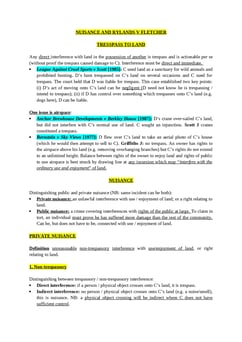Chandler v Cape Plc [2012] [2012] EWCA Civ 525; [2012] 1 WLR 3111; [2012] 3 All ER 640
Judgement for the case Chandler v Cape Plc
Table Of Contents
KEY POINTS
-
Negligence arises when a party fails to exercise reasonable care, resulting in harm or injury to another party.
In occupational safety, the duty of care is a fundamental principal employers owe to their employees.
This duty encompasses providing a safe and healthy work environment to prevent harm or injury.
-
In a scenario involving an employee contracting asbestosis after exposure to asbestos dust at work, questions arise about the duty of care owed by the employer.
The complexity deepens when the employer is a subsidiary company, and the parent company is aware of the risks associated with the nature of the work.
-
In such cases, legal considerations include whether the parent company assumes responsibility for the employees of its subsidiary.
There is the question of whether the duty of care extends from the subsidiary to the parent company, specifically in advising on a safe work system.
This raises broader inquiries into the overall responsibility and liability of the company owing to the duty of care to its employees.
The intertwining elements of negligence, duty of care, and the relationship between a parent company and its subsidiary become crucial in determining legal obligations and potential liabilities concerning the well-being of employees exposed to occupational hazards.
FACTS
David Brian Chandler ("Claimant") worked as a brick loader for a subsidiary of Cape Building Products Ltd ("Defendant") company from 1959 to 1961 to 1962.
-
The workplace, where asbestos was produced in an open-sided factory, led to dust migration into the claimant's area.
After fifty years, the claimant developed asbestosis and filed a claim against Cape plc ("Defendant"), alleging a direct duty of care to advise or ensure a safe working system for subsidiary employees.
The Defendant acknowledged the subsidiary's failure in duty, as it had been dissolved.
-
During the trial, it was revealed that the Defendant employed a group medical adviser and a scientific officer responsible for employee health and asbestos dust suppression, respectively.
The Defendant's board discussed and authorized many aspects of the production process during the Claimant's employment with the subsidiary.
Based on this evidence, the trial judge concluded that there was sufficient proximity between the Claimant and the Defendant to impose a duty of care.
The judge deemed it fair, just, and reasonable to hold the Defendant accountable for protecting the Claimant from harm caused by the atmosphere of asbestos.
The case was appealled by the Defendant.
JUDGEMENT
-
On appeal, the court dismissed the Defendant's case, ruling that a duty of intervention arises when a relationship imposes responsibility.
While acknowledging the separate status of a subsidiary and its parent company, the court emphasized that absolute control is not required for a duty of care.
In this case, the law might hold a parent company responsible for the health and safety of subsidiary employees if their businesses are significantly similar.
-
Given the Defendant's knowledge of the Claimant's workplace and superior understanding of asbestos risks, the court concluded the Defendant had a duty of care.
This duty involved advising the subsidiary on a safe work system or ensuring its implementation.
The failure to provide such advice resulted in injury to the Claimant.
COMMENTARY
The case underscores the legal complexities of negligence and duty of care in occupational safety, especially when a subsidiary is involved.
Despite the subsidiary's dissolution, the court found the parent company had a duty of care, emphasizing that control isn't mandatory for such obligations.
The court's decision on appeal reaffirms the idea that relationships can impose responsibility, holding the parent company accountable for harm due to its failure to advise on or ensure a safe work system.
For Further Study on Chandler v Cape Plc
Need instant answers? Our AI exam tutor is here to help.
Ask questions 🙋 Get answers 📔 It's simple 👁️👄👁️
Our AI is educated by the highest scoring students across all subjects and schools. Join hundreds of your peers today.
Get StartedSimilar Cases
Related Product Samples
These product samples contain the same concepts we cover in this case.
| Tort Law | Negligence Duty Of Care Notes (35 pages) |

